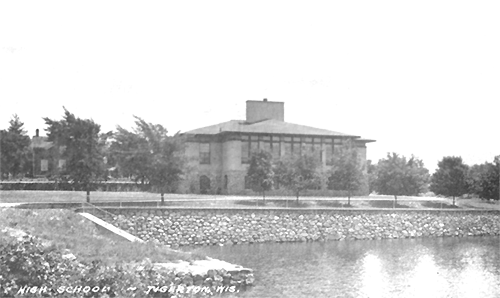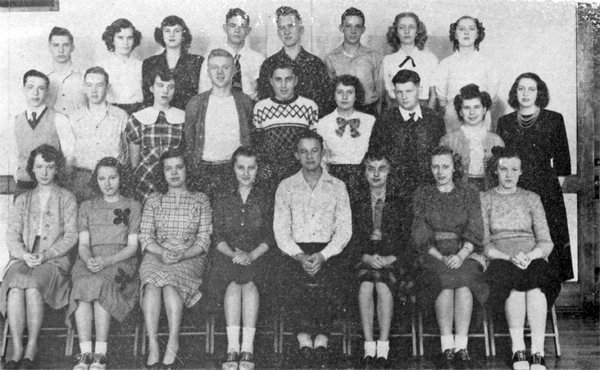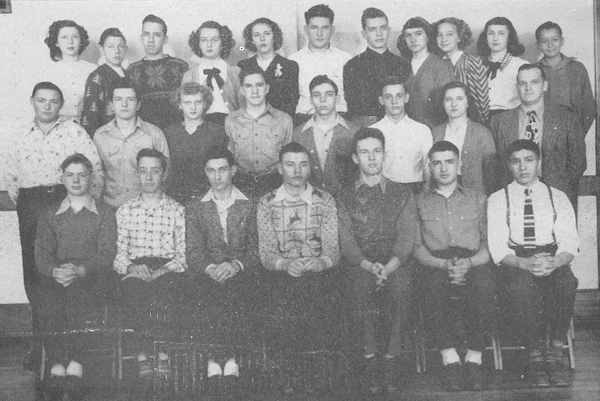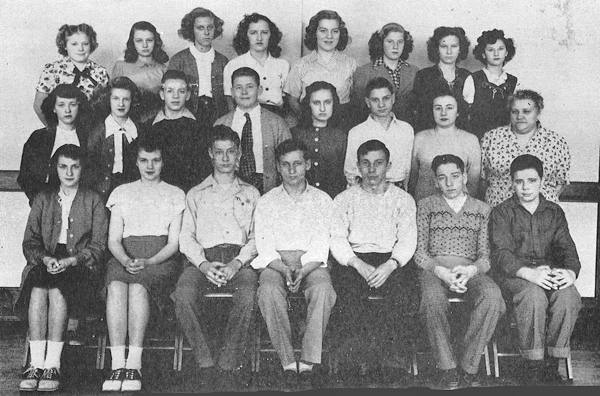|
 |
|
Click here
for The Quiet
Un-Frank Sinatra Version
Here's the 1948 TIGER
YEARBOOK from Tigerton High School. This was a great find
as it has provided some super information on the HISTORY of
TIGERTON -- the 1948 Senior Class not only gives a glimpse at
their high school years (1944 - 1948), they also give a history
of Tigerton itself! Very nicely done!
And I learned something
about the SHAWANO COUNTY SCHOOL STRUCTURE...
"There are 103 school districts in
the county. We also have five high schools, and two union free
high schools. There are 75 one-room rural schools and three
two-room rural schools. Within the county there are 13 state
graded schools." I was surprised to realize that as
late as 1948, there were 75 one-room schools still being used.
First, are the histories and
then the links to the actual pages & photos... ENJOY! |
|
 |
|
THE HISTORY OF
TIGERTON (1948)...
by
Dennis Konkol
The Village of Tigerton is located on both sides of the South
Branch of the Embarrass River. It was incorporated as a village
in 1894 and at the present has a population of about 800.
The first railroad that was built through this area was the Lake
Shore Railroad in the years 1879-80. It went as far north as
Eland in 1880.
The first tavern on record was established in 1880 and was just
a tent in the alley back of the Hoffman Hotel. It was about the
same time that the first sawmill was built which was located
where the old ice house used to stand and owned by Newbold and
Livingston. Livingston also started the first grocery store on
the corner where the Bowling Alley now stands. The Newbold Hotel
was erected that same year and it was located where the Swanke
home now stands. In 1921 it was torn down and the Swanke home
was built. It was around this time that Grundy-Brigham erected a
Veneer Mill where the Canning Co. now stands. The Wall Spaulding
Co. came in and bought the sawmill and the veneer mill. The
veneer mill burned down several years later.
One of the first four
families that came to Tigerton was the Leitzke family in 1880.
Mr. Leitzke started the first blacksmith shop in town back of
the Bowling Alley.
John McDevitt also
came to town in 1880. He bought some land and built a hotel and
tavern on the corner where the Tigerton Motor Sales is. In 1894
he sold out to George Bohman and returned to farming.
In 1881 Mr. and Mrs. Mathias Schumacker came to Tigerton. Their
first house was built of logs and here they boarded men employed
on the railroad Mr. Schumacker died in 1882 but Mrs. Schumacker,
assisted by her son, Wm., continued the boarding business and in
1894 they started a mercantile business under the name
Schumacker & Son.
Mr. Herman Swanke,
Sr. of whom Tigerton can well be proud, was the oldest of a
family of six. He did not get much schooling because he had to
help his father on their big farm. He remained at home until
others could take his place and then engaged in the wheat
business with his father. At the age of seventeen he wanted to
see the country so he went west and traveled through Iowa,
Minnesota, Dakota and Montana. He served on the police force in
Omaha and in Council Bluffs for two years. He then returned to
Wisconsin and engaged in the threshing business until the year
1885. He came to Tigerton in 1885 and embarked in the lumber
business. He and three others built a mill at the expense of
$3,000. At this time Tigerton was still a vast wilderness with
but few settlers. He saw the town grow up to what it is today
and he himself had a great deal to do with its development.
The mill burned down and was rebuilt at an expense of $10,000.
Mr. Swanke owned half-interest in the mill at this time. He was
also interested in two other mills, one at Whitcomb and one at
what we call the "Old Mill Dam." He disposed of these two mills
in later years and he also bought out the other interests in the
mill in town. In 1910 the mill in town was enlarged and
remodeled and that's the way it is today. Mr. Swanke held vast
timber and land tracts all over the country. In 1921 he built
the beautiful large home on the river but only lived to enjoy it
a little over a year.
John Lehman was the first village president in 1893. He also had
a general store in the building Mr. George Gauthier now
occupies.
The first post office stood on the corner where Mr. Fred Kersten
now lives and the first Post Mistress was Mrs. Murdock.
In 1899-1900 the First National Bank was built. It was in the
building now being used as our Post Office. The bank building
now in use was erected in 1921.
The village hall was erected in 1905. A public library is
located within the hall on the second floor and the Fire
Department is on the first floor.
A canning factory was built in 1926 and beans and peas were
canned. They found that canning beans was too expensive so they
only canned peas.
Water works were
installed in 1936-37 but due to rock, sewerage has never been
put in.
In 1881 the first Catholic settlers in Tigerton held service at
the Schumacker residence. The pastor was Rev. Father Richard of
Wausau. They erected a new church in 1884 and it is still
serving.
July 2, 1882, Rev. Pumcer of Wittenberg held the first services
for the St. John's Lutheran Church. The congregation outgrew
their little church and in 1903 the beautiful brick structure
they now occupy was erected.
The Zion Lutheran Church was organized in May 1891 with twelve
charter members. The first Minister was Rev. August Jennrich.
The building was dedicated in September 1891 and it is in use
today.
In 1881 the first schoolhouse was built on the lot between the
bank and Swanke home. The school became too small and a new one
was built across from the Oscar Stearn home. A larger school
again was needed so a three-room structure was put up where the
grade school stands. That burned down about thirty-eight years
ago and the grade school we now have was built and served as
both grade and high school. In 1908 the taxes that were levied
on the school amounted to $900.
In 1917 a meeting was held authorizing the School Board to apply
for a $10,000 loan to build a new High School.
The building was completed in 1919 at an expense of $16,400.
Tuition students were admitted. The Tigerton High School is
located on the east side of the Village of Tigerton. The
southern branch of the Embarrass River flows past the west side
of the building. The building is surrounded by a beautiful and
well kept lawn. Trees, which lend an air of stateliness, are
growing along the river bank.
In this well kept school, you citizens at the present time may
be proud to have one of the highest rated small schools in the
state and with the addition of the new gym it will be able to
serve the community all the better. For a small school,
athletics, forensics, dramatics and music rank close to the
larger schools.
The citizens of Tigerton and adjoining townships can be very
proud of their fine little village.
THE HISTORY OF
SHAWANO COUNTY...
by
Suzanne Swanke
Tonight, perhaps for the last time, this class is gathered
together. We have been together for at least four years, most of
us more than that. We have lived in or around Tigerton almost
all of our lives, but after tonight some of us will move beyond
this village - out into Shawano county.
Shawano county is situated in the northeastern part of the
state. The name Shawano means "On the South" or "Place of the
South". We are located sixty miles from Michigan and 140 miles
from Illnois. Langlade and Oconto Counties form our northern
border; Oconto and Brown, the eastern border; Outagamie and
Waupaca, the southern; and Marathon and Langlade, the western
border.
There is nothing distinctive in the geographical structure of
the county. We have sands and we have rich soils. We have lakes
and streams -- forests and plains.
The city of Shawano, located to the eastern part of the county
near the lake of the same name, is the seat of county
government. It was near here that the first white settler of
Shawano county settled. Although the first men ever to enter the
county were the early Jesuit Missionaries, the first settler was
Charles Wescott who settled in the Town of Richmond. In 1843
Wescott and some other men built a saw mill on the banks of the
Wolf River. This site later became the city of Shawano.
Shawano county is one of the largest counties in the state --
ranking tenth out of seventy-one. It has only 1,000 acres less
than Grant county which is ninth and approximately 9,000 acres
more than Oneida county which ranks eleventh.
The records are incomplete, but indicate a town meeting was held
in April, 1853. In November of that year county officers were
elected. The first meeting of the county board that is recorded
was on November 13, 1855. The board met to settle the accounts
and charges of the county for the year 1854.
The federal census show that at the time the county was
incorporated the population was 254. In 1860 the census gave the
county a population of 829, showing a gain of 575 in the
preceding five years. This hardly compares with the 1940 census
of 35,378. It was in about the year 1860 that the county began
to enter upon a new era of development.
Although the land
within the county is rocky, farming is the main occupation.
Wescott broke soil for the first time when he planted potatoes
soon after the completion of the mill. In 1945 we ranked twelfth
in the number of farms in the county. We had a total of some
3,623 farms. In the number of acres of cropland harvested we
rank 29 throughout the state.
Shawano county ranks twelfth out of seventy-one in total milk
production. In 1944 it was found that 55% of the farmers income
came from milk. In total cheese production we rank eighth. The
total gross income is good enough to place us in the 22nd place.
As far as crops go we rank from tenth in hay to 39th in corn for
grain.
Farmers still retain the woodlot as a sure income. The assessors
of the county estimated that during the 12 months July 1944-June
1945 inclusive the value of products cut from the wood lots of
the county was about $591,600. These products are fuel, fence
posts, sawlogs, pulpwood, rairoad ties and miscellaneous
products.
The manufacturing within the county deals mostly with
foodstuffs. The last census taken in 1939 showed 110
establishments—88 of which were producing food products. Fifteen
of the remaining number were producing lumber products;
printing, paper and furniture factories took care of the rest.
The first mails were carried over Indian trails -- now we have
many good highways. Sometime in the 1850's a road was
established between Shawano and New London. Ten years later we
have the establishment of our first railroad.
The county is rich in scenic beauty with the Menominee Indian
Reservation within its boundaries. The Wolf River, Shawano Lake
and other lakes also give many recreational opportunities. The
County has a 35-acre park on Shawano Lake, located seven miles
out of the Shawano city limits. There you will find, located
across from the Park, a Riding Academy, Golf Course, and Girl's
Private Camp. Lakes and streams throughout the county team with
trout, panfish, bass, wall-eyed and northern pike.
Our schools are ranked among the best in the state. There are
103 school districts in the county. We also have five high
schools, and two union free high schools. There are 75 one-room
rural schools and three two-room rural schools. Within the
county there are 13 state graded schools. The school census for
the county is 5,989 as of June, 1947.
We have now many
industries and farms whose total value is estimated at
54,747,491. The first settlers wasted land and trees but slowly
and surely we are replacing the waste.
Definitely
established is the fact that the achievements of the past are
indicative of the possibilities of the future, and who can
calculate the results of another half century of progress ?
|
|
And the 1948 Senior THS Class: |
|
Page 9 |
Robert
ALBERG |
Harold
DAVIDSON |
Frank
HOFFMAN |
| |
Jeanette
HOLM |
Dennis
KONKEL |
|
|
|
Page 10 |
Marjorie
KRIEGEL |
Donald
LEHMAN |
Delores
MINNIECHESKE |
| |
C. Edward
ROESKE |
Alyce
ROHLINGER |
|
|
|
Page 11 |
Erma
RUPPENTHAL |
Robert
RUPPENTHAL |
Lillian
SHEST |
| |
James
SWANKE |
Suzanne
SWANKE |
|
|
|
|
|
1948 Junior THS Class
|
 |
| FRONT ROW:
Lois Seefeldt, Janet Mogensen, Caryl June Laars, Marcella
Klingbeil, Robert Schlender, Stella Schriber, Ruth Polly
and Dorothy Johnson |
| SECOND ROW:
Allan Wendt, Lawrence Paterson, Lorraine Keilbach, James Heins,
Richard Green, Carol Steinberg, Roscoe Much, Joan Landsberg and
Miss Buchsieb |
| BACK ROW:
Bernard Kestner, Elizabeth Holm, Patricia Garrow, Duane Hoffman,
Martin Lehman, Robert Krolow, Lorna Krueger and Sylvia
Abrahamson |
|
The
Junior class, under the supervision of Miss Buchsieb, is a very
active group. Many of the boys are out for baseball and
basketball. A number of Juniors take part in band and Glee club.
Forensics also includes students from the class. To earn money
they sold candy at the basketball games and in school. And of
course they have their classes—English III, Chemistry, Geometry,
Home Economics, Shop, U. S. History, Shorthand and Advanced
Typing. Page 15 |
|
|
1948 Sophomore THS Class
|
|
 |
| FRONT ROW:
Joan Kielblock, Marvin Clark, Gerald Krueger, Nancy O'Dell,
Delores Klingbile, James Wesener, Burton Doty, Alice Heger,
Sharlene Curtis, Virginia Hoffman and Ervin Christjohn
|
| SECOND ROW:
Gene Polley, Myron Bazille, Donna Mathison, Robert Hille, Gerald
Hendricks, Harold Hoeksema, Joanne Szumnarski and Mr. James |
|
BACK ROW: Eugene Seefeldt, John
O'Dell, Clifford Lehman, Donald Mogenson, Jerome Kopp, Jerome
Alft and Ernest Stevens |
|
Upon arrival to Tigerton High School, the Sophomores were
assigned to their new seats. This really meant something, for
now they were closer to those seats by the windows which meant
the senior year and graduation. It also meant initiating the
Freshmen, but that was just a minor detail. Wasn't it,
Sophomores? There was an enrollment of 25 pupils at the
beginning of the school year. One member, Jerome Kopp, was added
and one member, Donna Bauer, was lost. They elected Mr. James as
their Class Adviser. Page 16 |
|
|
1948 Freshman THS Class |
|
 |
|
FRONT ROW:
Marcella Hoffman, Delilah Vollmer,
Donna Krolow, Grace Klingbeil, Joanne Butts, Bette Stewart,
Virginia Kluck, and Marjorie Kauffman |
|
SECOND ROW: Joan Bazile, Lee lla
Vollmer, John Neubauer, Ronald Retzloff, Mary Jean Lehman, Duane
Westphal, Delores Kriegel and Mrs. Roller |
|
BACK ROW:
Nancy Schultz, Roma Redman, Gilbert Selle, Robert Hendricks,
Donald Prignitz, Dennis Damrau and Kenneth Sambs |
|
Twenty-four students enrolled at Tigerton High School, September
9, 1947 to begin their educational foundation for the future.
For the first few weeks of school the students were busy
adjusting themselves to high school life. They received their
first idea of it when they were initiated by the Sophomores.
They soon were working very industriously and are doing fine in
their academic work. They represented their class well in
extra-curricular activities.
Page 17 |
|
|
|
|
If you can identify anyone on the
Hi-Life pages,
let me know and we'll add their names. |
|
|
GRADUATION - May 28, 1948 |
|
MOTTO "We Have Crossed the Bay, the Ocean Lies Before Us."
FLOWER Red and White Carnation
COLORS Red and White
CLASS PRESIDENT'S SPEECH
Robert Ruppenthal
SALUTATORY ADDRESS Nancy
Woltman
CLASS HISTORY
Donald Lehman
CLASS PROPHECY Harold
Davidson
CLASS WILL Erma
Ruppenthal
HISTORY OF TIGERTON Dennis Konkol
HISTORY OF SHAWANO COUNTY Suzanne Swanke
HISTORY OF WISCONSIN Frank Hoffman
VALEDICTORY ADDRESS
Jeanette Holm
SPEAKER Mr. A. L. Pahr, Superintendent of Shawano County
Schools
|
|
|
And I've added THE MUSICAL HITS OF
1948...
The musical trends of
1948 included the continuing transition from big bands to
individual singers, as well as the increasing popularity of
lighthearted novelties, often set to arrangements based on
diverse musical genres.
The Andrews Sisters -
Toolie Oolie Doolie - 05-48
The Andrews Sisters - You
Call Everybody Darling - 10-48
The Andrews Sisters -
Underneath The Arches - 11-48
Eddy Arnold - Anytime -
05-48
Eddy Arnold - What A Fool
I Was - 05-48
Eddy Arnold - Texarkana
Baby - 07-48
Eddy Arnold - Bouquet of
Roses - 09-48
Eddy Arnold - A Heart Full
Of Love - 12-48
Count Basie - Blue And
Sentimental - 01-48
Tex Beneke - St. Louis
Blues March - 05-48
Frankie Carle - Beg Your
Pardon - 03-48
Buddy Clark - Ballerina
01-48
Buddy Clark - I'll Dance
At Your Wedding - 01-48
Nat 'King' Cole - What'll
I Do - 01-48
The Nat 'King' Cole Trio -
Nature Boy - 05-48
Nat 'King' Cole - Don’t
Blame Me - 07-48
The Nat 'King' Cole Trio -
Little Girl - 11-48
Perry Como - Because -
04-48
Perry Como - Rambling Rose
- 09-48
Francis Craig - Beg Your
Pardon - 02-48
Bing Crosby - Now is the
Hour - 04-48
Doris Day - Put 'Em in a
Box, Tie 'Em in a Ribbon - 05-48
Doris Day & Buddy Clark -
Love Somebody - 08-48
Doris Day - It's Magic -
09-48
The Dinning Sisters - Beg
Your Pardon - 03-48
The Dinning Sisters -
Buttons and Bows - 11-48
Tommy Dorsey - Until -
11-48
Billy Eckstine -
Everything I Have Is Yours - 10-48
Gracie Fields - Now is the
Hour - 03-48
Ella Fitzgerald - Tea
Leaves - 06-48
Ella Fitzgerald - My
Happiness - 10-48
The Glenn Miller Orchestra
- Adios - 07-48
Ken Griffin & Jerry Wayne
- You Can't Be True, Dear - 05-48
Ken Griffin - You Can't Be
True, Dear - 07-48
Dick Haymes & Gordon
Jenkins - Little White Lies - 05-48
Dick Haymes - Nature Boy -
06-48
Dick Haymes - You Can't Be
True, Dear - 06-48
Dick Haymes - It's Magic -
09-48Woody Herman - Sabre Dance - 05-48
Lena Horne - Deed I Do -
05-48
Eddy Howard - Now is the
Hour - 02-48
Pee Wee Hunt - 12th Street
Rag - 08-48
The Ink Spots - Say
Something Sweet to Your Sweetheart - 12-48
Gordon Jenkins - Maybe
You'll Be There - 10-48
Spike Jones - William Tell
Overture - 06-48
Spike Jones - All I Want
For Christmas - 12-48
Louis Jordan - Run Joe -
08-48
Danny Kaye & The Andrews
Sisters - The Woody Woodpecker Song - 07-48
Sammy Kaye - Serenade of
the Bells - 01-48
The Stan Kenton Orchestra
- How High The Moon - 07-48
Kay Kyser - Woody
Woodpecker Song - 07-48
Kay Kyser - On A Slow Boat
To China - 11-48
Frankie Laine - Shine -
04-48
Julia Lee - King Size Papa
- 03-48
Peggy Lee - I'll Dance At
Your Wedding - 01-48
Peggy Lee - Golden
Earrings - 01-48
Peggy Lee - Manana - 03-48
Peggy Lee - Caramba! It's
The Samba - 06-48
Guy Lombardo - I'm My Own
Grandpa - 01-48
Gordon MacRae - It's Magic
-09-48
Gordon MacRae - Hair Of
Gold, Eyes Of Blue - 10-48
Freddy Martin - Sabre
Dance Boogie - 04-48
Freddy Martin - The
Dickey-Bird Song - 05-48
Freddy Martin and His
Orchestra - On A Slow Boat To China - 12-48
Tony Martin - For Every
Man There's A Woman - 06-48
Tony Martin - It's Magic
-09-48
Carmen Miranda - Cuanto La
Gusta - 11-48
Vaughn Monroe - How Soon
-01-48
Vaughn Monroe - The
Maharajah Of Magador - 08-48
Vaughn Monroe - Cool Water
- 10-48
Vaughn Monroe & His
Orchestra - Ev'ry Day I Love You - 10-48
Art Mooney - I'm Looking
For A Four Leaf Clover - 02-48
Art Mooney - Baby Face -
05-48
Art Mooney - Blue Bird Of
Happiness - 10-48
Russ Morgan - Bye Bye
Blackbird - 02-48
Russ Morgan - I'm Looking
For A Four Leaf Clover - 03-48
Rose Murphy - I Can't
Give You Anything But Love - 01-48
Patti Page - Confess 07-48
Jan Peerce - Blue Bird Of
Happiness -10-48
The Pied Pipers - My
Happiness - 07-48
Dinah Shore - Buttons and
Bows - 11-48
Frank Sinatra - But
Beautiful -04-48
Frank Sinatra - All Of Me
- 05-48
Frank Sinatra - Nature Boy
- 06-48
Frank Sinatra - Everybody
Loves Somebody - 07-48
Frank Sinatra - Just For
Now - 08-48
Kate Smith - Now is the
Hour - 04-48
The Sportsmen & Mel Blanc
- Woody Woodpecker Song - 07-48
Jo Stafford - The Best
Things In Life Are Free - 01-48
Jo Stafford - Haunted
Heart - 02-48
Jo Stafford - Serenade Of
The Bells - 12-48
Jon & Sondra Steele - My
Happiness - 06-48
Al Trace - You Call
Everybody Darling - 08-48
Sarah Vaughn - It's Magic
- 09-48
Jimmy Wakely - One Has My
Name (the Other Has My Heart) - 11-48
Margaret Whiting - But
Beautiful - 01-48
Margaret Whiting - Now is
the Hour - 03-48
Margaret Whiting - A Tree
In The Meadow - 10-48
Frank Yankovic - Just
Because - 06-48
|
|
 |
|
|